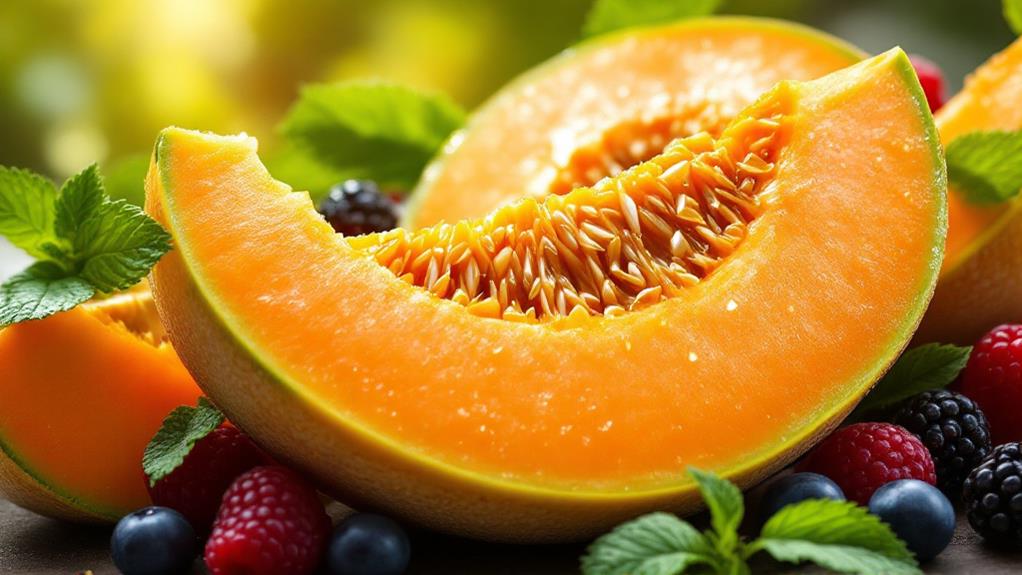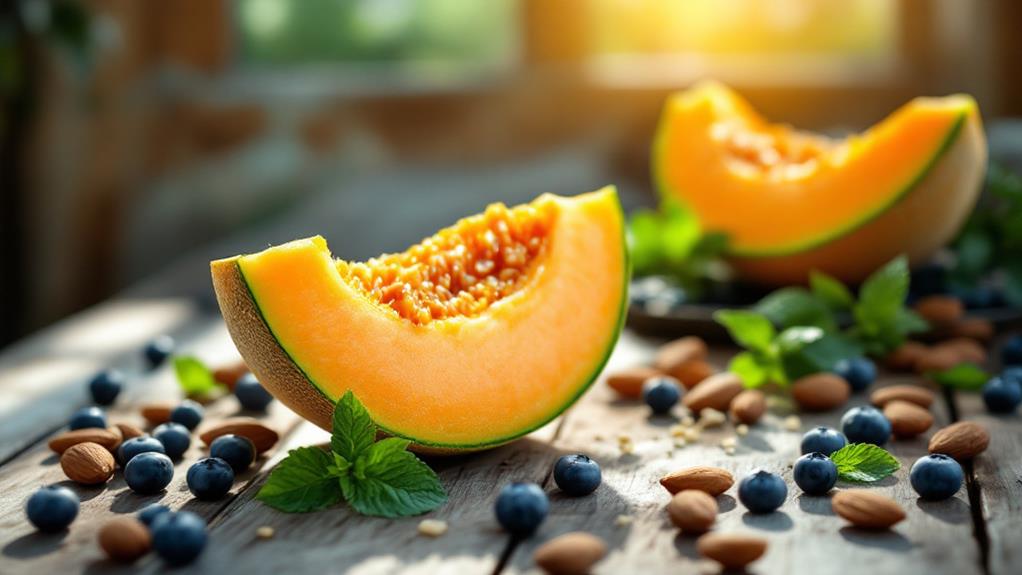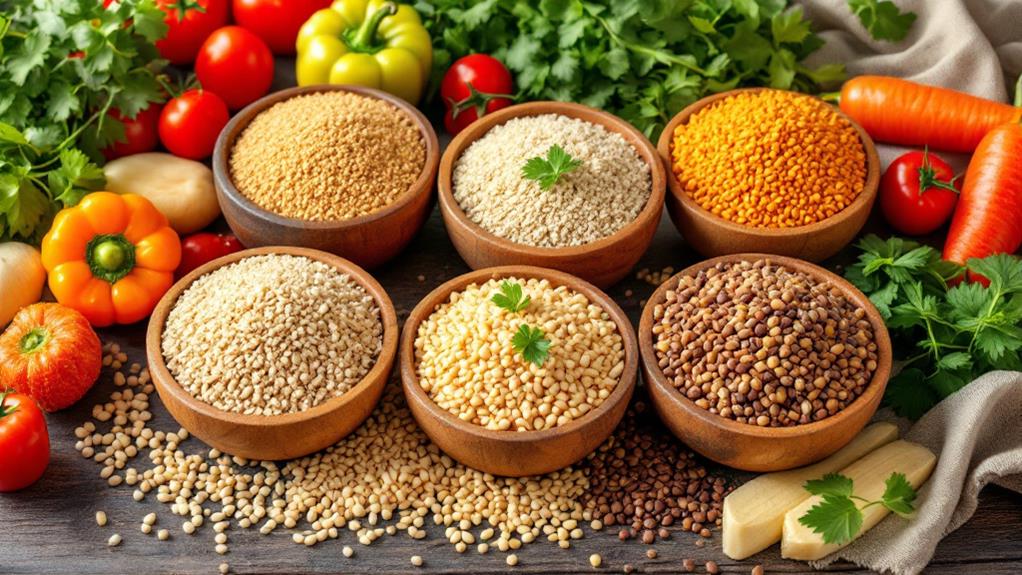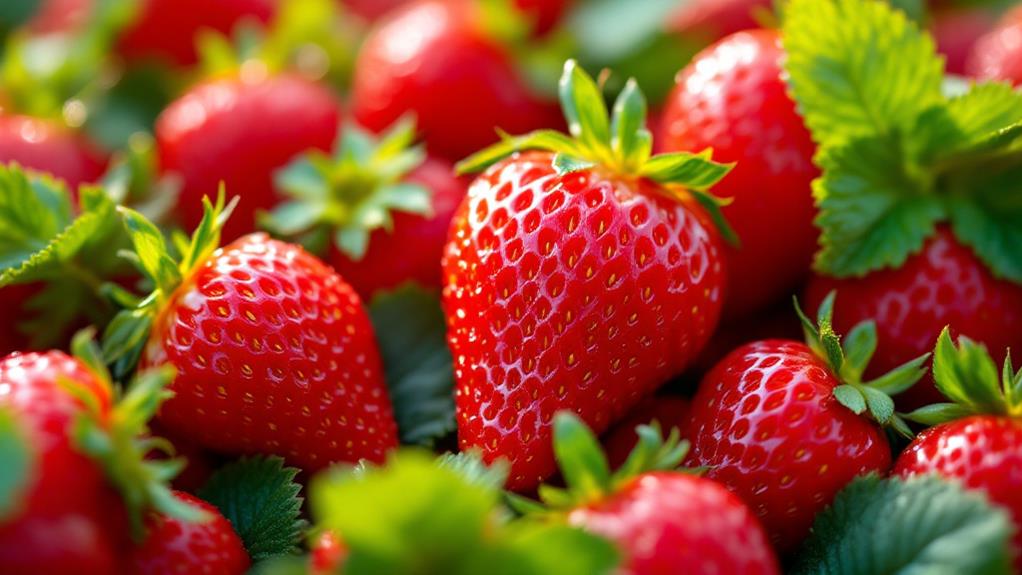Cantaloupe: A Health Booster in Disguise You Need in Your Diet

Adding cantaloupe to your diet offers a surprising enhancement to your health. It's 90% water, keeping you hydrated while satisfying with sweetness. Packed with vitamins A and C, it supports your immune system and skin health. The high potassium content aids in regulating blood pressure, and its dietary fiber promotes digestion. Antioxidants in cantaloupe may lower risks of chronic diseases like cancer. However, remember to wash it thoroughly to avoid bacteria. With its low calorie count, it's perfect for weight management too. There's much more about this delightful fruit that could positively transform your dietary routine.
Understanding Cantaloupe
In the domain of understanding cantaloupe, there's a lot to appreciate about this delicious fruit. It's not just a tasty treat, but a powerhouse of vitamins and minerals that can bring a host of health benefits to your life. Cantaloupe, or Cucumis melo reticulatus, is known for its net-like rind and juicy, orange flesh. This popular summer fruit is especially hydrating, with a water content of nearly 90%. By incorporating cantaloupe into your diet, you help support your body's hydration and comprehensive functions.
Cantaloupe is rich in vital nutrients, providing over 100% of your daily requirement for vitamins A and C in just one serving. These vitamins are key for maintaining good vision, enhancing your immune system, and ensuring healthy skin. Beyond these, cantaloupe also offers dietary fiber and potassium, which are significant for digestive health and maintaining proper heart function.
Moreover, cantaloupe contains phytonutrients with anti-inflammatory properties that may reduce your risk of chronic diseases such as diabetes and certain cancers. When selecting the perfect cantaloupe, look for a symmetrical shape, a heavy feel for its size, and a slight yellow hue, indicating ripeness and sweetness.
Nutritional Benefits
You'll find that cantaloupe is not only delicious but also packed with impressive nutritional benefits. This juicy fruit is a fantastic supplement to your diet, offering numerous health perks. Here's why you should consider indulging in cantaloupe more often:
- Low in Calories: With only 53 calories per cup, cantaloupe is perfect for weight management. You can enjoy its sweet flavor without worrying about calorie overload.
- Rich in Nutrients: Each cup provides over 100% of your daily recommended intake of vitamin C, which is vital for boosting your immune system and maintaining healthy skin. Vitamin A is also present, supporting your vision and skin health.
- Potassium Content: Cantaloupe contains about 10% of your daily value of potassium per cup. This mineral is important for regulating blood pressure and promoting heart health.
- High Water Content: Nearly 90% of cantaloupe is water, making it an excellent choice for hydration. Its high water content helps maintain fluid balance and keeps you refreshed.
Moreover, cantaloupe offers 1.5 grams of dietary fiber per cup, aiding digestion and promoting gut health. With these benefits, cantaloupe is a tasty way to improve your nutritional intake.
Health Advantages

Plunge into the health advantages of cantaloupe, a fruit that's not only tasty but also packed with nutrients that improve your well-being. Initially, consider its high vitamin C content—65 mg per cup—which plays a significant role in enhancing your immune system. This vitamin helps protect your body against infections, making it necessary for maintaining ideal health. In addition, the antioxidants in cantaloupe, including vitamin C and beta-carotene, help reduce the risk of chronic diseases. They achieve this by shielding your cells from oxidative stress and inflammation.
Cantaloupe also contains 473 mg of potassium per cup, which is fundamental for cardiovascular health. Potassium helps regulate blood pressure, contributing to a healthy heart and reducing the risk of hypertension. Furthermore, with its 1.6 grams of dietary fiber per cup, cantaloupe aids digestion and promotes bowel regularity, supporting your digestive system.
Its high water content—around 90%—makes it an excellent choice for hydration. Proper hydration supports kidney health and can aid recovery after exercise. By incorporating cantaloupe into your diet, you'll enjoy these health benefits while savoring a delicious and invigorating fruit.
Potential Risks
Beware of the potential risks associated with cantaloupe, despite its many health benefits. While it's a delicious and nutritious fruit, cantaloupe carries some cautions you should be aware of:
- Foodborne Illnesses: The textured rind of a cantaloupe can harbor bacteria like Salmonella. This increases the risk of foodborne illnesses if the fruit isn't washed thoroughly before cutting.
- High Potassium Levels: If you have kidney disease, the high potassium content in cantaloupe poses a risk. Excessive potassium can lead to hyperkalemia, a condition where potassium levels in your blood are dangerously high. It's essential to monitor your intake and consult with a healthcare professional.
- Digestive Issues: With its high fiber content, cantaloupe might cause digestive discomfort. This is particularly true for individuals with inflammatory bowel diseases or those recovering from bowel surgeries. The fiber can exacerbate symptoms, so moderation is key.
- Salmonella Concerns: Since cantaloupes are ground-grown, they have been linked to Salmonella outbreaks. This highlights the importance of understanding potential risks and ensuring proper handling and storage.
Always consider these concerns and seek medical advice if you have health conditions that might be affected by cantaloupe consumption.
Safe Handling Tips

Ensuring safety is paramount when handling cantaloupe. You should always wash the cantaloupe's exterior thoroughly with water and a vegetable brush. This step is essential because its textured rind can trap harmful pathogens, potentially leading to foodborne illness. Once you've cleaned the cantaloupe, use a clean knife and cutting board to prevent cross-contamination with other foods. Immediately clean all cutting surfaces and utensils after preparing your cantaloupe to maintain a hygienic kitchen environment.
When it comes to enjoying cantaloupe, be mindful of its high potassium content. If you have kidney disease, consuming too much potassium could lead to hyperkalemia, a condition where potassium levels become dangerously high in the blood. Hence, it's wise to consult with a healthcare professional if you're concerned.
Additionally, always check for signs of spoilage before eating cantaloupe. Avoid any fruit that has an off smell, soft spots, or an unusual texture. These indicators could suggest the presence of harmful bacteria, increasing the risk of foodborne illness. By following these safe handling practices, you can enjoy the delicious benefits of cantaloupe without compromising your health.
Storage Guidelines
With regard to storing cantaloupe, proper methods guarantee you enjoy its full flavor and freshness. Start by storing whole cantaloupes on the counter for 1-2 days after purchase to secure peak flavor and texture. When ready to consume, wash the exterior thoroughly to prevent bacteria from the rind contaminating the fruit. Once you've cut the cantaloupe, it's essential to follow specific storage guidelines to maintain its quality. Here's what you should do:
- Refrigerate Immediately: Store cut cantaloupe in the refrigerator to keep it fresh. Leaving it at room temperature can lead to rapid spoilage.
- Use Airtight Containers: Placing cut cantaloupe in airtight containers or wrapping it in plastic wrap minimizes air exposure, extending its shelf life.
- Consume Promptly: Try to eat the refrigerated cantaloupe within a few days. The longer it sits, the more it loses its freshness and nutritional value.
- Clean Surfaces and Utensils: After cutting, clean all surfaces and utensils to prevent cross-contamination with other foods in your kitchen.
Culinary Ideas

Exploring the culinary possibilities of cantaloupe opens up a world of lively and nutritious dishes. Start with a colorful fruit salad by mixing cantaloupe with berries, mangoes, and avocado. This combination not only bursts with flavors but also packs a punch of vitamins and antioxidants.
For a delightful breakfast, layer Greek yogurt with granola and diced cantaloupe to create a parfait that's both satisfying and nourishing. The creaminess of the yogurt complements the juicy sweetness of the cantaloupe, ensuring a revitalizing start to your day.
If you're looking for something unique, try blending cantaloupe with citrus juices and spices to whip up a chilled soup. It's an inventive dish that serves as a light appetizer or a cooling summer treat.
Don't overlook the seeds; they can be cleaned and roasted just like pumpkin seeds, offering a crunchy snack that's both healthy and addictive.
Choosing the Best Cantaloupe
When you're picking out a cantaloupe, aim for one that feels a bit heavy for its size and has a symmetrical shape. This is a good indicator that the cantaloupe is ripe and juicy, just waiting to be enjoyed. To guarantee you make the best selection, keep an eye out for the following:
- Color Check: Look for a creamy yellow-orange color on the underside of the cantaloupe. This signals that it's matured on the vine and is ripe.
- Aroma Test: Give the cantaloupe a sniff near the stem end. A sweet aroma is a clear sign of a flavorful and ripe fruit, promising a delicious taste.
- Inspect for Imperfections: Avoid cantaloupes with soft spots, bruises, or a dull appearance, as these may indicate overripeness or spoilage, which detracts from the eating experience.
- Storage Tips: For ideal freshness and flavor, consume the cantaloupe within 3 days of purchase. Whole fruits can be stored at room temperature for 1-2 days before refrigeration.
Maximizing Health Benefits

A single serving of cantaloupe can be a powerhouse for your health, offering over 100% of your daily vitamin A and C needs. By consuming just 1-2 cups daily, you markedly increase your intake of vital nutrients. These vitamins are important for maintaining healthy skin, enhancing your immune system, and supporting vision. Plus, cantaloupe's high water content—around 90%—keeps you hydrated, which is particularly beneficial after exercise or in hot weather.
Cantaloupe isn't just about vitamins; it's packed with antioxidants like beta-carotene, lutein, and zeaxanthin. These compounds help protect your cells from damage and may lower your risk of chronic diseases, such as certain cancers and age-related eye conditions. Including cantaloupe in your diet can improve your general health by reducing inflammation.
The fiber in cantaloupe, about 1.6 grams per cup, promotes digestive health by aiding regular bowel movements and helping you feel full, which can assist in weight management. Furthermore, the potassium content supports heart health by regulating blood pressure. Regularly incorporating cantaloupe into a balanced diet guarantees you're maximizing its health benefits for a healthier lifestyle.




